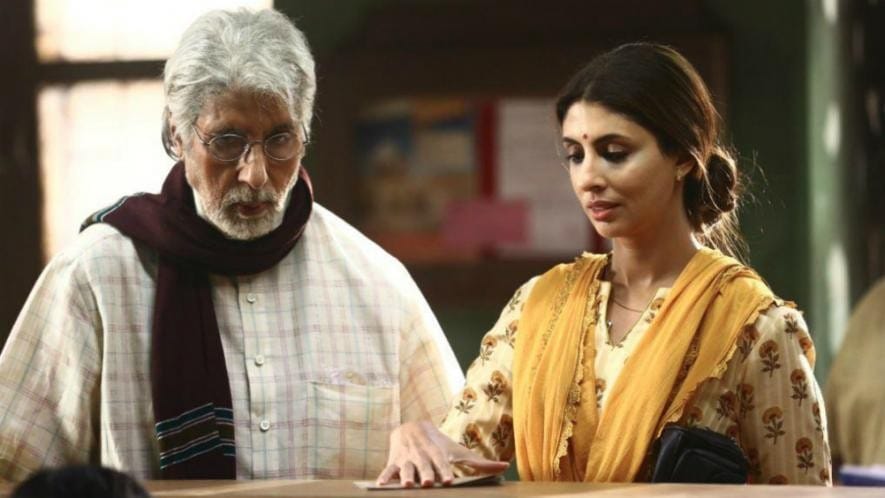
A disclaimer can save a life
Kalyan Jewellers recently found itself at the receiving end of ire from the government bankers' association
 Amitabh Bachchan with Shweta Bachchan in Kalyan Jewellers Commercial AD
Amitabh Bachchan with Shweta Bachchan in Kalyan Jewellers Commercial AD First, the claim.
Last week, All India Bank Officer's Association (AIBOC), the largest association of bankers in India, claimed that the theme, tone and tenor of the latest Kalyan Jewellers TV commercial featuring Bollywood actor Amitabh Bachchan and his daughter Shweta Nanda was "disgusting, derogatory, and was aimed to create distrust in the banking system for pure commercial gain." The advertisement, the press release by the banking union elaborated, portrays banks in bad light.
For the uninitiated, the Kalyan Jewellers TVC, made by L&K Saatchi and Saatchi, plays on the theme of Vishwasam or honesty. The premise of the commercial is that a father-daughter duo visit a bank to return the extra pension credited erroneously. The duo is not only spurned by unresponsive officers but it also shows one banker suggesting that they keep the money since the procedure to return the money is tiresome.
The advertisement, the bank union claims, portrays banks in bad light, "casting aspersion, hurting the sentiment of millions of personnel, stakeholders and is a direct attempt to ruin the trust and confidence of billions of citizenries in banks."
The Kerala-based jewellery brand responded with an apologetic disclaimer but later on Sunday, withdrew the controversial advertisement.
Kalyan, in an earlier media statement, had said that the commercial was an "‘act of pure fiction and at no point intended to generalise the bank officers at large."
However, while withdrawing the commercial, executive director Ramesh Kalyanaraman apologised. "We sincerely regret the inadvertent hurt caused and withdraw the advertisement from all media with immediate effect," he said.
This is the second time that Kalyan Jewellers has had to withdraw a commercial.
TR Ramesh, the executive director (Marketing) of Kalyan had offered an unconditional disclaimer earlier. “We shall add (before the advertisement) that characters and situations depicted are fictional. The brand does not intend to disrespect or malign any person or community,” he clarified. However, its firefighting attempt of issuing a disclaimer didn't work either.
The bankers, reckon advertising gurus, have erred with an exaggerated over-reaction. “It’s (advertisement) not a comment on any institution,” Piyush Pandey, executive director and creative chairman of Ogilvy (South Asia), said. “It’s a pure story-telling, and people should calm down,” the celebrated adman said. The commercial, he lets on, needs a context and that’s it. “Nobody should read too much into it.”
Marketing expert Harish Bijoor, who runs an eponymous brand consultancy, also contends that there is nothing objectionable in the commercial. “You will object if you see truth here. And if you as a bank see truth, then the problem exists,” he added, adding that the message in the advertisement is more important than the medium.
Interestingly, it’s not the first time that public sector banks have been the butt of joke.
In February this year, former cricketer Virender Sehwag also took a dig at them when he compared on-field umpires in the Centurion one-day international match to government bankers, after they called a 40-minute lunch break when India required only two runs to win against South Africa in the second one day international (ODI).
“Umpires treating Indian batsmen like PSU bank treat customers. Lunch ke baad aana (come after lunch),” Sehwag tweeted. The former swashbuckling batsman followed up his tweet with another sharp-witted comment: “Most sarkaari (government) banks, in fact most sarkaari departments don’t care for the common man. The attitude is like mai baap (literally, mother father; here, anything goes).”
Though the tongue-in-cheek tweet went viral—over seven thousand retweets and fifth thousand likes—it drew sharp criticism from the bankers, who took exception to way banking culture was mocked.
The general perception about the PSU banks not being customer-centric was reinforced by a study by Indian Customer Satisfaction Index (ICSI) in 2016, which interestingly had no Indian bank among the top three.
HSBC, a foreign bank, topped the list of 12 large banks with a customer satisfaction score of 76, Standard Chartered and Citibank--two more overseas banks--came close on its heels with a score of 74 and 73, respectively. Kotak Mahindra Bank ranked fourth, followed by ICICI Bank, Bank of Baroda, Axis Bank and HDFC Bank. The country’s largest public sector bank, State Bank of India (SBI), a PSU bank, ranked the lowest.
Just like PSU bankers, who have often been ridiculed, Kalyan too is not new to controversies. In April 2015, Kalyan had to withdraw an advertisement after civil right activists slammed its creative depicting Bollywood actress Aishwarya Rai Bachchan being waited upon by a dark-skinned native child slave.
The most baffling aspect of the entire controversy, point out experts, is the oversight on the part of marketers and creative agency to run a disclaimer.
“A disclaimer is the most potent weapon to blunt any reaction,” says Ashita Aggarwal, marketing professor at SP Jain Institute of Management and Research. The very idea of disclaimer, she points out, is to pre-empt any move to sue a person or a brand. “Disclaimer also gives the creative heads a refuge to depict reality using fictional characters,” she adds.
The only hope is that Kalyan Jewellers learns from its controversies and bankers too, take a jibe gracefully every now and then.





